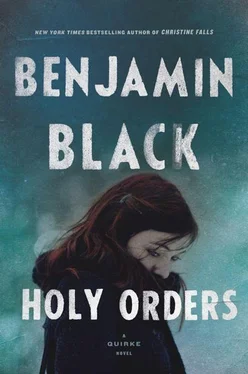“Apparently he did. But I don’t know what it could have been that he wanted to talk to me about. Do you?”
“I’ll say again — something about your work, maybe.”
“Maybe so, maybe so. We’ll never know, now, will we.”
They watched each other, sitting very still, hunched forward a little in their chairs. One of the turf logs in the fireplace collapsed softly, throwing sparks onto the hearth and rolling another ball of smoke out across the floor. Quirke picked up the cigarette case. “What’s this?” he asked, pointing to the monogram on the lid.
“Fleur-de-lis,” the priest said. “A woman had it done for me, years ago.” He smiled at Quirke’s raised eyebrow. “Oh, yes, Doctor, I too was loved, once.”
“What happened?”
“Nothing happened. She was married, and I was young. She came to me for confession, invited me home to meet her husband. He was a builder — or an architect, was it? I can’t remember. Well-to-do people, anyway. She knitted socks for me, and gave me that”—pointing to the cigarette case—“and nothing, Dr. Quirke, nothing happened. I suppose you can’t imagine a love like that?”
Quirke gazed at the cigarette case where it lay on his palm. “Why did you telephone me, Father?” he said. “Why did you want to talk to me?”
The priest threw up his hands, laughing softly. “Such questions, Doctor, and you ask them over and over! I already said, people told me things about you. I was curious to see what you were like. And now I’ve seen you, and I think you are a very angry man. Oh, yes — I can see it in your eyes. That place — Carricklea, was it? — marked you for life, that’s plain.”
“Are you going to tell me now to forgive and forget?”
“I wouldn’t dream of it. Your pain is your own, Doctor. No man has a right to tell you what to do with it.” He smiled his glinting smile, then suddenly sat upright and clapped his hands on his knees. “And now,” he said, “I must love you and leave you, for the hour is late and Desperate Dan will be fretting that I’m gallivanting about the town and neglecting my priestly duties.” He stood up, and held out a hand. “I’m very glad to have met you, Doctor. I hope our paths will cross again. Good night to you, sir.”
He made a brisk bow from the shoulders, and walked away. Quirke had not spoken, had uttered no farewell. He sat gazing into his glass, in the depths of which the glow from the fire had set a ruby light burning. It reminded him of the light of the sanctuary lamp behind that stained-glass wall he had come up against so disconcertingly at Trinity Manor.
Father Honan, heading towards the door and passing by the three priests at their table, sketched a sort of swift, ironical blessing over their heads. One of them rose hastily to speak to him, but Father Honan did not stop, only put a finger to his lips and shook his head smilingly, and passed on out, through the doorway. A moment later he was back, however, and crossed swiftly to where Quirke sat. “A thing I meant to say to you, Doctor: a great theologian — which of them I can’t for the moment recall — once asked, ‘What kind of a self-respecting God would concern himself with the poor likes of us?’ Or words to that effect. I don’t know what the answer might be, but the question, I find, affords me comfort, especially in times of anguish and loss of certainty. You might think on it, yourself. It lends a little bit of perspective, I find, to the grand scheme of things.”
He nodded, and turned, and was gone again. This time he did not come back.
Phoebe had moved the previous winter from a bed — sitting room in Baggot Street to a flat in Herbert Place. She had hesitated over moving there, since that was where her friend April Latimer had lived before her disappearance. But Phoebe was not superstitious, and anyway the flat was at the other end of the street from where April’s had been. And it was a lovely flat; she was lucky to have found it. She had two big rooms on the first floor, the front one overlooking the canal and Huband Bridge and the willow tree that grew there. The back room, the bedroom, was a bit gaunt, with heavy mahogany furniture — a vast wardrobe, two chests of drawers, and a tallboy — but it had a big square-shaped window that was always full of light, particularly in the morning, and quite a few of its many small panes seemed to be the original glass, and gave a wonderful rippling effect, especially when rain was streaming down them. Strange to think of the generations of people, long gone now, who had stood here, looking out on the gardens and the mews and, beyond them, the roofs of the houses on Herbert Street. She did not mind that her father lived just round the corner, in Mount Street; she knew there would be no question of his dropping in on her. The very notion of Quirke dropping in on anyone was laughable.
She had offered Sally the bedroom, but Sally had taken one look at the four-poster double bed with its absurdly squat legs and said she would be fine on the sofa in the front room. There were spare sheets and a pillow, but for bedclothes she had to make do with a wool throw from the back of one of the armchairs, with her own overcoat on top. When they had done assembling the makeshift bed they stood back to admire it, with their hands on their hips, and smiled at each other in complicitous fashion; friends already, Phoebe thought, and something thickened for a moment at the back of her throat.
Phoebe made cocoa for both of them and with their mugs they sat on the floor in front of the gas fire in the lamplight, listening to the sound of the rain falling outside. Phoebe was reminded of being at boarding school, that time one Easter when she was fifteen, and she and another girl had stayed on when everyone else had gone home for the holidays. Phoebe’s parents had been away in America, visiting her grandfather, who was ill. She could not remember what the reason was for the other girl staying behind. Her name, Phoebe remembered, was Monique, which seemed very exotic, like the name of someone in a foreign film. It had been exciting, in a queer, cozy sort of way, being there together, just the two of them, in the almost deserted school, with only the head nun, Sister Aloysius, and a couple of young novices to look after them. They had scoffed clandestine midnight feasts — not at midnight, of course, but long after bedtime, all the same — and in the afternoons they had lounged in armchairs in the library with their shoes off and their feet folded under them, reading and, more often, talking. Monique had smuggled in a packet of cigarettes, and they stood and smoked by an open window in the senior girls’ bathroom, feeling very grown-up and scandalous. They even planned to sneak out one night and take the bus into town and go to the pictures, but their nerve failed them. Monique had a secret boyfriend at home — she lived in Belfast — who was older than she was, and whom she allowed to do things to her, so she said, that Phoebe at the time could not imagine being done to her.
“It’s very kind of you,” Sally said, “to take me in like this.”
“I haven’t ‘taken you in’!” Phoebe cried, laughing. “You make it sound as if you were a stray cat or something.”
They sipped their cocoa, watching the silky blue flames throbbing along the bars of the gas fire. Phoebe liked the sensation of her shins being hot while the backs of her legs were cool. She had thought of changing into her dressing gown but felt it would not be quite the thing to do, in the circumstances. She was not used to having someone staying with her; in fact, no one had ever stayed here overnight, or in the bed-sit in Baggot Street, either, not even David — especially not David.
“I knew I’d like you,” Sally said now, in a slightly tentative way, as if she had guessed what Phoebe had been thinking. “James and I always liked the same people.”
Читать дальше












